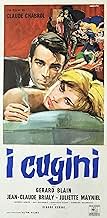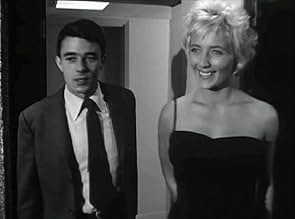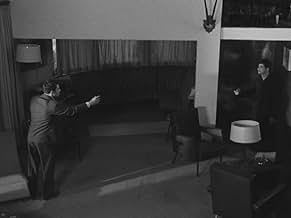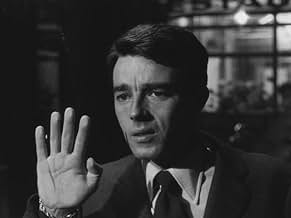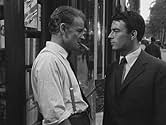IMDb-BEWERTUNG
7,2/10
3421
IHRE BEWERTUNG
Zwe Cousins teilen sich eine Wohnung, doch die Feindseligkeit zwischen den beiden nimmt zu, als eine Frau ins Spiel kommt.Zwe Cousins teilen sich eine Wohnung, doch die Feindseligkeit zwischen den beiden nimmt zu, als eine Frau ins Spiel kommt.Zwe Cousins teilen sich eine Wohnung, doch die Feindseligkeit zwischen den beiden nimmt zu, als eine Frau ins Spiel kommt.
- Regie
- Drehbuch
- Hauptbesetzung
- Auszeichnungen
- 1 wins total
Empfohlene Bewertungen
Les Cousins is definitively part of the French New Wave of the late 1950s. Whilst slightly more polished than the films of his contemporaries (notably Godard and Truffaut), Chabrol's film bubbles with an insurgence of new cinematographic techniques and fresh acting talent. The sense of newness is reinforced by presence of so many young actors, dressed elegantly in tuxedos and evening dresses, but acting somewhat delinquently for the most part. The film appears almost like the christening party for the birth of a new era in French cinema.
Both the direction and photography are of a high calibre and capture very well the changing mood of the central character, Charles. The film starts cheerfully and optimistically with the young man's arrival in Paris. Like him, we are enchanted by the bright lights, the wide boulevards and the historic monuments. But then, little by little, the mood changes to ennui and disappointment when the shallowness of the Paris jet set is revealed. Finally, a much darker mood prevails as Charles' best efforts to succeed are brutally crushed by a combination of circumstances, partly of his own making but largely as a result of the hand of fate. This ability to alter the mood of the film so subtly and effectively is one of Chabrol's great skills as a director and is used to far greater effect in some of his subsequent thrillers.
Both of the two central characters, Charles and Paul, are played admirably by Gérard Blain and Jean-Claude Brialy. Blain manages to capture the innocence of the outsider and offers a sympathetic and memorable performance. Brialy seems to revel in his role as the extravagant city student, hosting his parties with the gusto of a true bon-vivant, whilst exhibiting a more complicated and sensitive persona in his conversations with the characters Charles and Florence.
Both actors were used by Chabrol in an earlier film, Le Beau Serge, which, in some ways, is the mirror image of Les Cousins. In Le Beau Serge, Brialy played a city boy who returns to his home in a provincial town where he met up wih a childhood friend played by Blain. Brialy's character was the outsider and ultimately he was destroyed by his alien surroundings. In Les Cousins, the situation is cleverly reversed. Here, Blain's character is a country boy who joins Brialy in the city of Paris. It is Blain's character who is now the outsider, and who is finally destroyed by his unfamiliar environment. It is interesting to watch the two films back-to-back, to note the similarities and compare the differences. Both films seem to side with the outsider and condemn the society that rejects him, although it is perhaps disappointing that, in both cases, that the outsider is destroyed without having any significant impact on the society that crushed him. At least, in Le Beau Serge, the victim's fate was sealed by an altruistic desire to do some good for the community that rejected him, whereas in Les Cousins, the victim brought his destruction on himself by trying to attack the society he felt so repulsive.
Les Cousins lacks the emotional intensity of Le Beau Serge and appears in some places a little too stage-managed. (The ending is particularly stagy, but it works perfectly to the film's advantage.) On the plus side, Les Cousins benefits from a far superior musical score, a more interesting set of characters, and some impressive location filming in Paris. It is an engaging and accessible film which still appears fresh and vibrant.
Both the direction and photography are of a high calibre and capture very well the changing mood of the central character, Charles. The film starts cheerfully and optimistically with the young man's arrival in Paris. Like him, we are enchanted by the bright lights, the wide boulevards and the historic monuments. But then, little by little, the mood changes to ennui and disappointment when the shallowness of the Paris jet set is revealed. Finally, a much darker mood prevails as Charles' best efforts to succeed are brutally crushed by a combination of circumstances, partly of his own making but largely as a result of the hand of fate. This ability to alter the mood of the film so subtly and effectively is one of Chabrol's great skills as a director and is used to far greater effect in some of his subsequent thrillers.
Both of the two central characters, Charles and Paul, are played admirably by Gérard Blain and Jean-Claude Brialy. Blain manages to capture the innocence of the outsider and offers a sympathetic and memorable performance. Brialy seems to revel in his role as the extravagant city student, hosting his parties with the gusto of a true bon-vivant, whilst exhibiting a more complicated and sensitive persona in his conversations with the characters Charles and Florence.
Both actors were used by Chabrol in an earlier film, Le Beau Serge, which, in some ways, is the mirror image of Les Cousins. In Le Beau Serge, Brialy played a city boy who returns to his home in a provincial town where he met up wih a childhood friend played by Blain. Brialy's character was the outsider and ultimately he was destroyed by his alien surroundings. In Les Cousins, the situation is cleverly reversed. Here, Blain's character is a country boy who joins Brialy in the city of Paris. It is Blain's character who is now the outsider, and who is finally destroyed by his unfamiliar environment. It is interesting to watch the two films back-to-back, to note the similarities and compare the differences. Both films seem to side with the outsider and condemn the society that rejects him, although it is perhaps disappointing that, in both cases, that the outsider is destroyed without having any significant impact on the society that crushed him. At least, in Le Beau Serge, the victim's fate was sealed by an altruistic desire to do some good for the community that rejected him, whereas in Les Cousins, the victim brought his destruction on himself by trying to attack the society he felt so repulsive.
Les Cousins lacks the emotional intensity of Le Beau Serge and appears in some places a little too stage-managed. (The ending is particularly stagy, but it works perfectly to the film's advantage.) On the plus side, Les Cousins benefits from a far superior musical score, a more interesting set of characters, and some impressive location filming in Paris. It is an engaging and accessible film which still appears fresh and vibrant.
Charles is a young provincial coming up to Paris to study law. He shares his cousin Paul's flat. Paul is a kind of decadent boy, a disillusioned pleasure-seeker, always dragging along with other idles, while Charles is a plodding, naive and honest man. He fell in love with Florence, one of Paul's acquaintances. But how will Paul react to that attempt to build a real love relationship?
Of the so-called French New Wave directors, Claude Chabrol has been called possibly the most mainstream (though less celebrated than Truffaut or Godard). We could also say he has a remarkable amount of stamina. "Les Cousins" was at the beginning of his career, and for decades he kept making great movies, including the notable "Madame Bovary" in 1991... and still kept going.
I love this film's blend of decadence and death. A simple man, with studies on his mind, is exposed to some bizarre scenes of sensuality, violence, crime, and even Nazi elements (in 1950s France?). This is what it is like if you take two opposing elements and allow them to spin out of control.
Of the so-called French New Wave directors, Claude Chabrol has been called possibly the most mainstream (though less celebrated than Truffaut or Godard). We could also say he has a remarkable amount of stamina. "Les Cousins" was at the beginning of his career, and for decades he kept making great movies, including the notable "Madame Bovary" in 1991... and still kept going.
I love this film's blend of decadence and death. A simple man, with studies on his mind, is exposed to some bizarre scenes of sensuality, violence, crime, and even Nazi elements (in 1950s France?). This is what it is like if you take two opposing elements and allow them to spin out of control.
The 13th film I saw of Claude Chabrol. The least I liked. I understand the meaning and the message of the film, but practically nothing captivated me: Neither the characters (nor Charles's own character captivated me) nor the rhythm of the film (a very long sequence in which we get to know Paul's friends, who swim and the way the "bourgeoisie" is presented to us, there are immense films that "capture" this social class in a much more skilful and humorous way, nor the message of the film, which I find to be inadequate and unlikely in the form how it is performed. I liked Chabrol's film the previous year, his first one, "le beau serge", curiously with the same double protagonist. I can not give this "les cousins" more than 6/10.
This film by Claude Chabrol reminds me of the old story of the country mouse and the city mouse. The country mouse is excited to see the big city but his bumbling provincial ways are out of step with his more sophisticated city cousin. This seems to be pretty much the basis for this film, "Les Cousins"! Though of course, being a Chabrol film it will have some dark edges and twists!
Charles is the guy raised in the country. He's slow and lacks confidence with women. Paul, on the other hand, was raised in the city and women hang all over him and put out like crazy for him. When Charles comes to stay with him while he goes to college, he is quite the contrast to Paul who is a confident ladies' man. He's also more bookish and introspective than Paul. All Paul wants is to have a good time and have sex--and he couldn't care less about his studies at the college. And, in a way, Paul has contempt for his cousin when Charles falls head over heels for Florence--and he soon beds Florence and asks her to move in with him. As for Charles, he is sad but sinks his energy into his classwork and tries to do the right thing. What's next for this odd mismatched pair? Bet you won't be able to guess!
This film is considered by many to be one of the best and earliest New Wave films. Like many New Wave movies, the normal film formulas are turned on their head and goodness isn't necessarily rewarded and the ending is quite ambiguous. Well worth seeing and darkly enjoyable.
Charles is the guy raised in the country. He's slow and lacks confidence with women. Paul, on the other hand, was raised in the city and women hang all over him and put out like crazy for him. When Charles comes to stay with him while he goes to college, he is quite the contrast to Paul who is a confident ladies' man. He's also more bookish and introspective than Paul. All Paul wants is to have a good time and have sex--and he couldn't care less about his studies at the college. And, in a way, Paul has contempt for his cousin when Charles falls head over heels for Florence--and he soon beds Florence and asks her to move in with him. As for Charles, he is sad but sinks his energy into his classwork and tries to do the right thing. What's next for this odd mismatched pair? Bet you won't be able to guess!
This film is considered by many to be one of the best and earliest New Wave films. Like many New Wave movies, the normal film formulas are turned on their head and goodness isn't necessarily rewarded and the ending is quite ambiguous. Well worth seeing and darkly enjoyable.
Chabrol's second film, made months after his first Le Beau Serge, and a more mature film director is evident. Helped, no doubt by those he gathered around him notably on script and camera, while the first film had charm and passion, this has that and more. Not only is this an interesting and intriguing tale of student life and affairs late 50s, the way it is shot opens up a whole new world of cinema. At least for the next five years this new Wave would dominate French cinema and also influence most of the world's cinema. With a fluid camera movement, jump cuts and an emphasis on 'real' people, having fun, being serious about politics, smoking all the time and having sex, cinema would, as they say never be the same again. Les Cousins is all of the above and entertains and amuses. Chabrol has complete control of the music this time, which works very well - even if it includes youngsters dancing around to Wagner! Important and enjoyable - can't say fair than that.
Wusstest du schon
- WissenswertesTwo endings were filmed, one optimistic (the reconciliation between the two cousins), which was discarded, and the other pessimistic, which was finally chosen.
- Zitate
Le libraire: Read Dostoyevsky. He addresses all your concerns.
- VerbindungenFeatured in Fejezetek a film történetéböl: A francia új hullám (1990)
- Soundtracks40e Symphonie en Sol Majeur (Koechel 550) 1er movement
Music by Wolfgang Amadeus Mozart (as W.A. Mozart)
Performed by London Symphony Orchestra (as Orchestre Symphonique de Londres)
Conducted by Josef Krips (as Joseph Krips)
Disque DECCA
Top-Auswahl
Melde dich zum Bewerten an und greife auf die Watchlist für personalisierte Empfehlungen zu.
- How long is The Cousins?Powered by Alexa
Details
- Erscheinungsdatum
- Herkunftsland
- Sprachen
- Auch bekannt als
- The Cousins
- Drehorte
- Produktionsfirmen
- Weitere beteiligte Unternehmen bei IMDbPro anzeigen
Box Office
- Budget
- 6.000.000 FRF (geschätzt)
- Laufzeit1 Stunde 52 Minuten
- Farbe
- Sound-Mix
- Seitenverhältnis
- 1.37 : 1
Zu dieser Seite beitragen
Bearbeitung vorschlagen oder fehlenden Inhalt hinzufügen

Oberste Lücke
By what name was Schrei, wenn du kannst (1959) officially released in Canada in English?
Antwort
